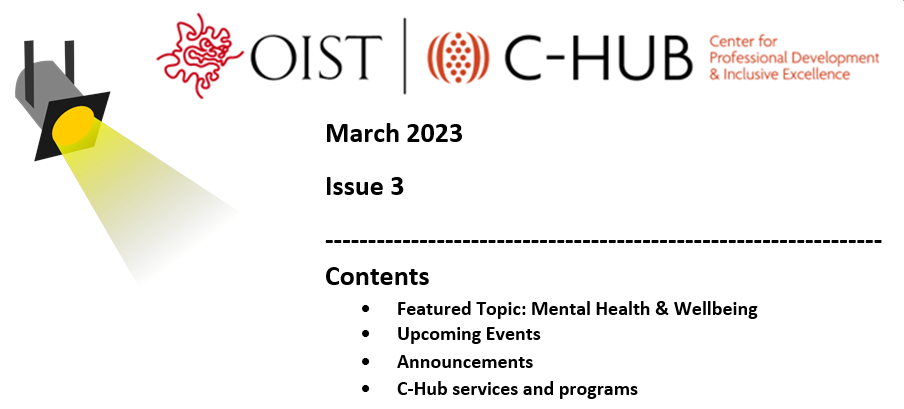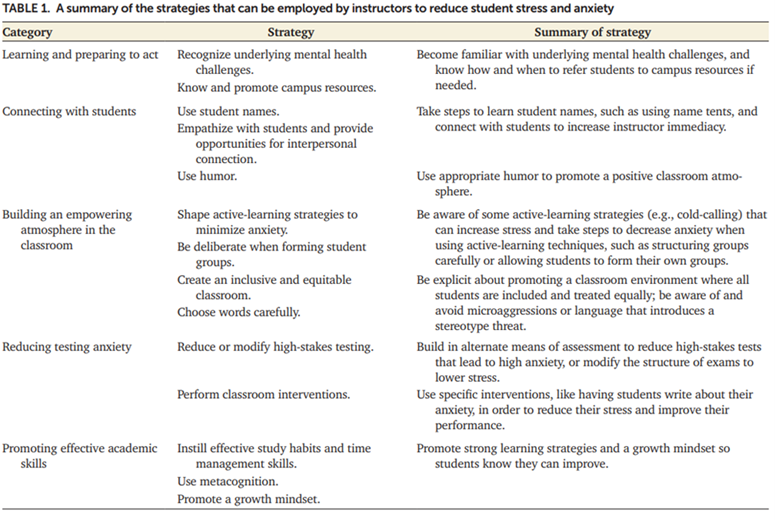C-Hub Spotlight, Issue 3, March 2023

Featured Topic: Mental Health and Wellbeing
A high-functioning organization depends on the mental health and well-being of all its members. Members of our university community should be encouraged to prioritize their own well-being and support the well-being of our students and colleagues. The cumulative effects of stress, or specific acute incidents can impact individuals physically and mentally. Microaggressions, bullying and harassment, and incidents of bias also have long-term detrimental effects. Creating inclusive climates for learning, research, and work can lay the foundation for promoting well-being. It is essential for preventing the stigmatization of our neurodiverse members of the community and fostering situations to support their needs. An inclusive environment "embraces a view of the individual and individual difference as the source of diversity that can enrich the lives and learning of others" (Hockings, 2010).

What’s the evidence?
The occurrence of mental health problems each year can be as high as 1 in every 5 adults. Given this prevalence, it is possible you may experience mental health challenges during your time at OIST or you may interact with students or colleagues whose wellbeing is impaired. Additionally, in the teaching realm, there is a strong correlation between the psychological well-being of teachers and the mental health of their students. Low levels of well-being decrease job satisfaction and performance and are known to lead to negative educational outcomes for students, such as poor performance on assessments and decreases in retention rates. Interventions, such as evidence-based programs focused on self-care activities or awareness-raising of issues affecting well-being, result in more utilizable knowledge and positive mindsets conducive to offering a hand to those in need and overcoming stigmatization.
It is imperative for universities to support and promote individuals’ acquisition of the knowledge and skills necessary to ensure the well-being of themselves and their peers or colleagues. Systematic efforts to promote wellness in diverse sociocultural contexts such as OIST lead to greater harmony and connectivity between individuals, with concurrent increases in self-efficacy, agency, self-reflection, and adaptive coping. For an excellent example of what OIST is doing, please see the Ganjuu Wellbeing Service webpages here.
Support and interventions to improve well-being often aim for the following outcomes:
- psychoeducation regarding mental health and wellbeing
- reduction or elimination of stigma for those with differences
- development and maintenance of positive mental health for community members, including enhanced self-care and self-regulation
- increased help-seeking behaviors and efficacies
What can YOU do?
Here are four actions you can take:
- take care of your own wellbeing (e.g., prioritize sleep, connect with others, get enough exercise)
- increase your awareness of when issues compromising wellbeing may be high in your unit or section and in the wider OIST community
- highlight times that may compromise wellbeing by voicing them to your students or colleagues in order to raise awareness
- demonstrate acceptance and help the community more easily accept and embrace well-being-related differences
- listen reflectively to those around you
Another highly effective intervention is psychological first aid, a very accessible skillset that can easily be learned and applied in times of stress. It’s evidence-based and widely promoted. Although often recommended for first responders on disaster scenes, this form of applied knowledge is directly applicable in educational settings as well. The Johns Hopkins School of Public Health has also created a Coursera course on the topic. Click here for more information.

Upcoming Events:
- Workshop (Zoom), "A New Paradigm: Pain Recovery is Possible," Friday, March 24, 10:00 to 12:00. Presented by Dr. Les Aria. This presentation will cover a new perspective on the definition of chronic pain, coupled with the new brain studies postulating that emotional and physical pains share the same neural networks. See the description of the event on the Ganjuu Wellbeing Services webpage here.
- Please join us for the 2023 Faculty Retreat, Friday, April 14, 2023, from 09:00 to 13:30 in the Conference Center, Meeting Room1. Lunch will be lunch provided.
This year, faculty will have the opportunity to learn more about research from units they are less familiar with, and to strategize about potential areas of connection for interdisciplinary partnerships and collaborations, shared equipment, jointly hosting interdisciplinary postdocs, or workshop proposals.
We aim to make this a productive workshop with tangible outcomes that benefit your research unit and create a closer faculty community. Please register here for the event by March 27. We would love to see you there!
Announcements:
- New videos from the Inclusive Leadership Symposium 2023 can be found here on the C-Hub webpages. The symposium was held February 1 & 2.
C-Hub Services and Programs:
C-Hub provides individual consultations for all members of the OIST community on a broad range of topics including career consultations, pedagogy, course and syllabus design, CVs and resumés (for the academic and non-academic job market), teaching portfolios and statements, DEI (diversity, equity, & inclusion), CliftonStrengths Coaching, work-life balance, etc. For more information, visit: https://groups.oist.jp/c-hub/consultations C-Hub offers regularly scheduled programs, such as the Teaching and Course Design Certificate Program, and Peer Mentoring Circles Program. Watch this space for future announcements.
References and Further Reading:
Doyle, N. (2020). Neurodiversity at work: a biopsychosocial model and the impact on working adults. British Medical Bulletin, 135(1), 108.
Hockings, C. (2010). Inclusive learning and teaching in higher education: A synthesis of research. York: Higher Education Academy.
Hsu, J. L., & Goldsmith, G. R. (2021). Instructor strategies to alleviate stress and anxiety among college and university STEM students. CBE—Life Sciences Education, 20(1), es1.
Kitchener, B. A., & Jorm, A. F. (2008). Mental Health First Aid: an international programme for early intervention. Early Intervention in Psychiatry, 2(1), 55-61.



